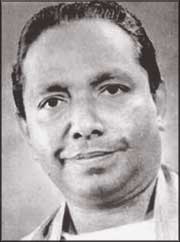Gunapala Piyasena Malalasekera
Gunapala Piyasena Malalasekera (8 November 1899 – 23 April 1973) was a Sri Lankan Buddhist scholar and diplomat. He was President of the All Ceylon Buddhist Congress, President of the World Fellowship of Buddhists, and one time Vice President and Editor - “The Buddhist” - of the Colombo YMBA.[1] His major works included an Encyclopedia of Buddhism and his well-known Sinhala-English dictionary.
Born to a conservative Sinhala Buddhist family in Malamulla in Panadura on 8th November, 1899, he was greatly influenced by his father, an Ayurvedic physician, conversant with Pali, Sanskrit, Sinhala and Buddhism. A diligent student, he graduated from the London University at the age of 19 years.[1]
He served on the staff of Ananda College from 1921 until 1923. In 1925, he obtained a Master of Arts (MA) Degree and a Doctorate in Philosophy (Ph.D) concurrently at the School of Oriental and African Studies of the University of London. Returning to Sri Lanka, he became the Principal of Nalanda College in 1926. A year later in 1927, he was appointed Lecturer in Sinhala, Pali and Sanskrit at the University College in Colombo.[1]
His thesis for the (Ph.D) was “Pali Literature of Ceylon” which was published by the Royal Asiatic Society of U.K. in 1928. While teaching at the University College, he compiled the voluminous “Dictionary of Pali Proper Nouns.” This very comprehensive work of 2,500 pages was published by the Government of India in 1937. Among his shorter works on Buddhism were “The Buddhist Doctrine of Anatta”; “The Truth of Anatta” “Aspects of Reality as Taught by Therayada Buddhism”; “Buddhism and the Race Question”, co-authored with Prof. K.N.Jayatilaka, and “Transference of Merit in Ceylon Buddhism”.[1]
In 1948, he published his famous Malalasekera Sinhala-English Dictionary. This popular dictionary is still in print (as of 2021).[2]
As a Buddhist Leader, he was associated with the All Ceylon Buddhist Congress (ACBC) for nearly five decades. He was its Joint Secretary for two consecutive years in 1927; Vice President from 1937 to 1939; and its President for 19 consecutive years from 1939 to 1957. The Congress substantially extended its activities and came to be recognized as an important voice of the Buddhist public of the country under his leadership. He gave up this position when he commenced his diplomatic career in 1957.
When the University of Ceylon was founded in 1942, he became the Professor of Pali and Head of the Department of Pali. Later he would serve as Dean of the Faculty of Oriental Studies, University of Ceylon.[3]
As a diplomat, he was the first Ambassador for Sri Lanka in the USSR. Later, he was the High Commissioner to Canada and the U.K. and subsequently was the Permanent Representative of Sri Lanka at the United Nations Organization. He had a successful diplomatic career over a period of ten years.[1]
Returning to Sri Lanka in 1967, he was once again elected President of the ACBC and held that post till his demise in 1973.
He also contributed by way of research papers and publications to the Pali Text Society of London under the patronage of scholars like Rhys David and I. B. Horner.[3]
One of his major undertakings was the English-language Encyclopedia of Buddhism which was inaugurated in 1956. He was its Editor-in-Chief from the beginning until his death in 1973.[1]
Honors
- Officer of the Order of the British Empire (Civil Division) (1949)[3]
- Justice of the Peace
- Membre d'Honneur of École française d'Extrême-Orient
- Commander of the Royal Order of Monisaraphon
- Buddha Sasana Vepulla Hitadhara from the Supreme Council of Buddhist Monks, Burma
References
- ↑ 1.0 1.1 1.2 1.3 1.4 1.5 Prof. Gunapala Malalasekera - Outstanding Buddhist Leader, Daily Mirror
- ↑ Perera, Gayani (22 August 2010). "M. D. Gunasena - "We taught the nation to read"". The Sunday Times. Retrieved 30 June 2021.
- ↑ 3.0 3.1 3.2
 Gunapala Piyasena Malalasekera, Wikipedia
Gunapala Piyasena Malalasekera, Wikipedia
External links
| This article includes content from Gunapala Piyasena Malalasekera on Wikipedia (view authors). License under CC BY-SA 3.0. |
